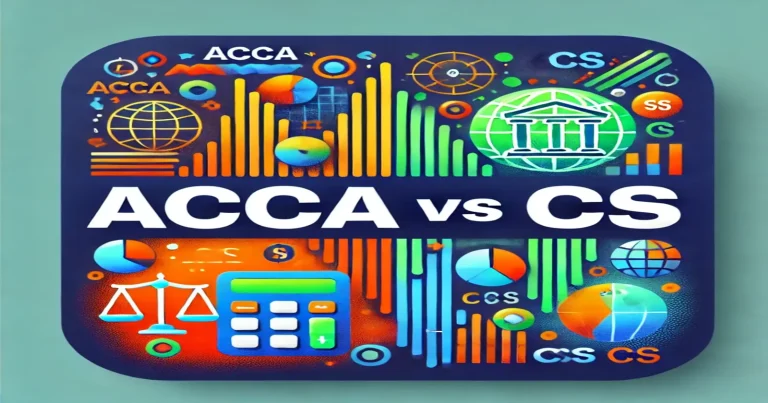Choosing between such professional qualifications as CS and ACCA usually depends on a simple choice between CS or ACCA. In this article, we are going to discuss the fundamental factors of those two top-level courses. What differences exist between them – both parties might get benefits from it – and which ones you should pay close attention to while making your final decision.
What is ACCA?
ACCA is one of the most recognized qualifications in international accounting and finance. The qualification is strictly trained in taxation and financial management, among others, to equip the professional for work in these areas.
Key Features of ACCA
- Global Recognition: ACCA is accredited in over 180 countries. So, professionals looking for work globally have great scope with this course.
- Curriculum: This course covers all kinds of syllabus, such as financial reporting, audit and assurance, financial management, and strategic business leadership.
- Eligibility: Enrollments are granted after a high school diploma or equivalent, as well as relevant coursework in mathematics and English.
- Course Duration: This will be 3-4 years, depending on the pace of student learning and exemptions.
What is CS?
The Institute of Company Secretaries of India (ICSI) offers a Company Secretary (CS) qualification. The CS Course mainly focuses on corporate governance, company law, and compliance with regulatory requirements.
Key Features of CS
- National Recognition: CS is very much recognized in India, with scope in the private and public sectors.
- Curriculum: The course modules include company law, corporate governance, tax laws, and financial analysis.
- Eligibility: To pursue the CS course, a candidate must have passed high school or equivalent qualification.
- Course duration: Usually 3-5 years based on the person’s capability to pass out the three levels of examination that CS conducts—the foundation, executive, and professional levels.
ACCA vs CS: Key Differences
Choosing between ACCA and CS depends on career goals, areas of interest, and geographical preference. Here’s a detailed comparison to help you understand these two courses better.
1. Recognition and Scope
- ACCA: Globally recognized. Scope includes multinational firm opportunities, accounting firms, international roles, etc.
- CS: Generally is known in India. Compliance, corporate law, and internal corporate governance roles.
2. Course Structure
- ACCA: More specialized in finance and accounting, including topics such as audit, tax, and financial management.
- CS: Focuses more on the legal aspects, company laws, regulatory framework, and business ethics.
3. Career Opportunities
- ACCA Careers: Roles in financial accounting, financial management, consulting, and taxation.
- CS Careers: Positions like Company Secretary, Compliance Officer, Corporate Advisor, and Legal Advisor within organizations.
4. Professional Growth
- ACCA: It provides a global career path with numerous opportunities across different sectors like banking, finance, consultancy, and investment.
- CS: It is more growth-oriented in the corporate structures regarding legality and compliance. Thus, it is more apt for a person interested in corporate law and governance.
5. Salary Prospects
- ACCA: International firms provide better wage-scale prospects. Recent graduates might expect around $50,000 to $80,000 in salary a year after passing.
- CS: Salaries in the Indian Market can match other market standards and can be upwards of ₹4 – ₹6 lakhs per annum and increase further with experience.
| Differentiators | ACCA (Association of Chartered Certified Accountants) | CS (Company Secretary) |
|---|---|---|
| Organizing Body | Association of Chartered Certified Accountants Body | The Institute of Company Secretaries of India (ICSI) |
| Levels | 1. Applied Knowledge 2. Applied Skills 3. Professional Level | 1. Foundation Course (for undergraduates) 2. Executive Program 3. Professional Program |
| Course Duration | 6 to 24 months | 2 to 3 years |
| Maximum Number of Exemptions Available | Up to 9 exemptions if CA course completed (appear for only 4 papers) | Full exemption from Foundation Level for Cost Accounting graduates |
| Minimum Eligibility Criteria | 10+2 exams with 65% in Mathematics/Accounts and English, and 50% in other subjects | 10+2 exams for Foundation Level; CSEET or Graduation/Foundation program for Executive Level |
| Difficulty Level (Average Passing Percentage) | 30% to 40% passing rate Difficulty: Moderate | 10% to 40% passing rate Difficulty: High |
| Exam Fees | Approximately INR 1,90,000 | Approximately INR 29,000 |
| Job Profiles | Financial Accountant, Management Accountant, Corporate Treasurer, Financial Controller, Finance Manager | Company Registrar, Chief Administrative Officer, Tax Management Officer, Corporate Planner, Corporate Policymaker, Legal Advisor, Principal Secretary |
| Average Salary | 7 to 18 LPA | 6 to 10 LPA |
| Countries Recognized | 180+ countries | Recognized in Singapore, UK, Hong Kong, Malaysia |
Factors to Consider When Choosing Between ACCA and CS
When deciding between CS and ACCA, several factors should be considered to align the qualification with your career objectives.
1. Career Goals
ACCA is the most appropriate if you want to pursue work in finance or accounting roles in multinational organizations. CS would be ideal if you are interested in legal compliance, corporate governance, or company law.
2. Geographical Preference
- ACCA: It is good for those who want to work internationally or in multinational corporations.
- CS: For those working in the corporate and legal environment within India.
3. Course Duration and Investment
- ACCA: 3-4 Years It depends on the course exemptions and how fast you are studying. Investment is relatively higher than that of CS.
- CS: 3-5 Years The investment cost is relatively moderate compared to global qualifications like ACCA.
4. Flexibility
- ACCA: Offers greater flexibility in terms of study options and exam scheduling.
- CS: Has a more structured learning approach with specific timelines for each level.
Conclusion
Both ACCA and CS hold very promising career paths, but again, the choice depends on what you want out of your career, what area you are interested in, and the market where you want to work. ACCA will be ideal for a global career in finance and accounting, and CS will be ideal for those who are interested in legal aspects of corporate governance within India.
ACCA vs CS FAQs
Which is better: ACCA or CS?
It depends on your career goals. ACCA is better for a career in global finance, while CS is ideal for corporate governance and company law roles in India.
What is the salary range for ACCA professionals?
ACCA professionals can expect a starting salary of INR 40,00,000 to INR 70,00,000 annually, which increases with experience and job role.
Is ACCA easier to pass than CS?
The difficulty level is subjective. ACCA requires strong analytical skills in finance and accounting, while CS involves in-depth knowledge of corporate laws.
Can I do both ACCA and CS together?
Yes, you can pursue both qualifications simultaneously, but effective time management is required due to the rigorous nature of both courses.
What are the job opportunities after completing CS?
CS professionals can work as company secretaries, compliance officers, and corporate advisors, as well as in other corporate governance and legal compliance roles.


